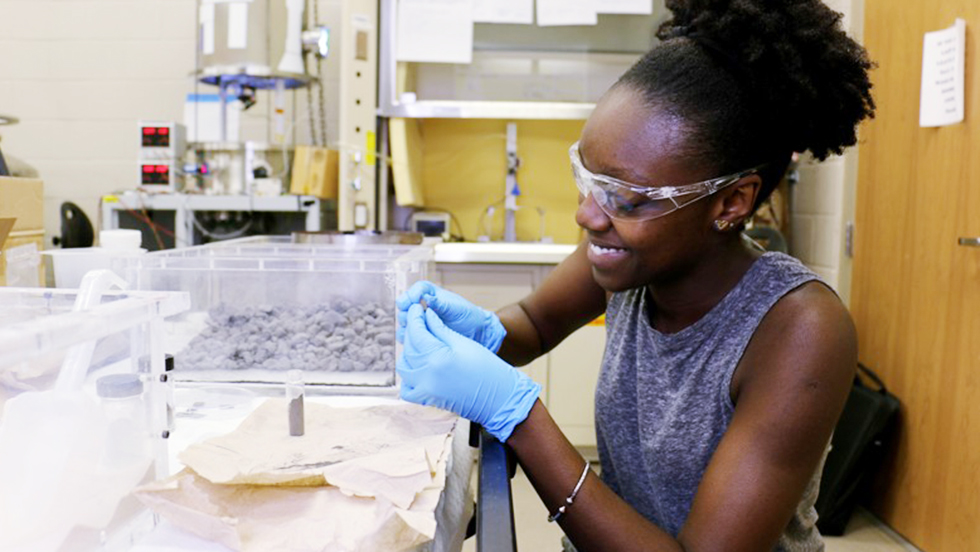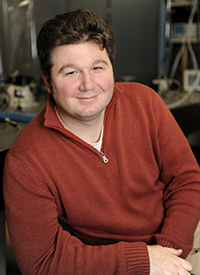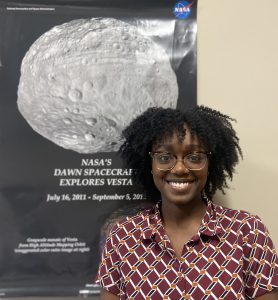
An Adelphi professor changed the course of this brilliant NASA researcher’s life—by connecting her with internships, helping her secure an opportunity with the National Science Foundation and serving as an extraordinarily caring mentor.
As a child growing up in Guyana, Keanna Jardine ’16, PhD, would look up at the stars and dream of the future.
She felt connected to the heavens at a deep level. She never thought she would find a way to turn that connection into a reality until she got to Adelphi University. There she found the support system she needed to turn her fascination with worlds beyond this one into a career.
Today, Dr. Jardine—who earned her doctorate in physics/planetary sciences at the University of Central Florida in 2023—is a planetary scientist working on a NASA research team at Arizona State University studying asteroid samples collected by the OSIRIS-REx Asteroid Sample Return Mission. The samples came from the asteroid Bennu and will give Dr. Jardine and other scientists a window into the time when the sun and planets were forming, about 4.5 billion years ago.
She’s come a long way from the days when she stood in her grandmother’s backyard looking for falling stars.
Finding an Extraordinarily Caring Mentor at Adelphi
Dr. Jardine immigrated to the United States with her parents when she was 10 years old. She went to an inner-city public school in New York City and came to Adelphi to study physics. “I didn’t have a strong academic background,” Dr. Jardine said. “I was intelligent, but, compared to some folks in my class, my background in science and math—especially math—was sort of weak.” In fact, she wasn’t sure she could make it in Adelphi’s physics program or any other STEM field. “I doubted myself,” she admitted.

Matthew Wright, PhD, associate professor and chair of the physics department, was Dr. Jardine’s adviser and mentor at Adelphi.
Then her Adelphi adviser, Matthew Wright, PhD, associate professor and chair of the physics department, stepped in. “He believed in me from day one,” Dr. Jardine said. Dr. Wright became her mentor and her champion. He helped her after school with her homework, keeping longer office hours to help her with any class in which she was struggling.
“She was ambitious,” Dr. Wright said of the young woman he met a dozen years ago. “The thing I remember very vividly was she had a worldview. Most students who come to physics are kind of narrow and they want to build a laser or something. Keanna had vision. She was looking over the horizon.”
Dr. Wright helped her get through her math classes. “He told me I was smart enough to do the math and encouraged me to keep pushing,” she said.
He also helped her through an even bigger challenge—the death of her mother, who was killed in a car accident while visiting Guyana during Dr. Jardine’s sophomore year.
Her world seemed to come apart. “I was devastated,” she said. “My mom was a teacher. Education was super important to my family. My mother was my biggest supporter.” Without her mother, she didn’t know if she could finish school.
Dr. Wright told her she could. “He’s the one who held on to me and said, ‘You are going to finish,’ ” she said. He even walked her to the campus Student Counseling Center so she could get help dealing with her grief.
“My dad and family really stepped up to help me through this period, too,” she said. “My dad had big shoes to fill, and he was amazing.”
With her family and mentor rallying around her, Dr. Jardine was able to push through. “Dr. Wright was very caring,” she said. “At a larger school, without this support network, I probably couldn’t have made it.”
A Career in the Stars

Keanna Jardine
To help Dr. Jardine pursue her interest in planetary science, Dr. Wright arranged for her to do two internships at the planetarium at the Cradle of Aviation Museum in Garden City, New York. “I made two planetarium shows and narrated them for the public,” she explained. “I loved it.” That’s when she realized her fascination with the stars could be turned into a career. “As I moved through my studies, opportunities came up and it led me full circle back to my initial interest when I was growing up in Guyana—the stars.”
Dr. Jardine was in the Levermore Global Scholars program, which she credits for helping her to get a broader worldview. “I didn’t get scientific knowledge there, but the experience made me more worldly and more well-rounded,” she says. “I got to go to the United Nations. It made me a citizen of the world.”
As her undergraduate career neared its end, Dr. Jardine wasn’t certain if she wanted to go to grad school and if she had the grades for it. Dr. Wright encouraged her to apply for the American Physics Society Bridge Program, a National Science Foundation effort to increase the number of PhDs awarded to students from underrepresented groups. The Bridge Program provides students one to two years of research experience, advanced coursework and coaching to prepare them for grad school applications.
Thanks to the Bridge Program, Dr. Jardine was admitted into the University of Central Florida, where she earned her master’s degree in addition to her doctorate. Now she spends her days in a NASA lab in Phoenix sifting through meteor particles for clues to how the universe formed.
“Living in Guyana, you don’t see a path to these career opportunities,” she says. “Adelphi helped me find the way there.”